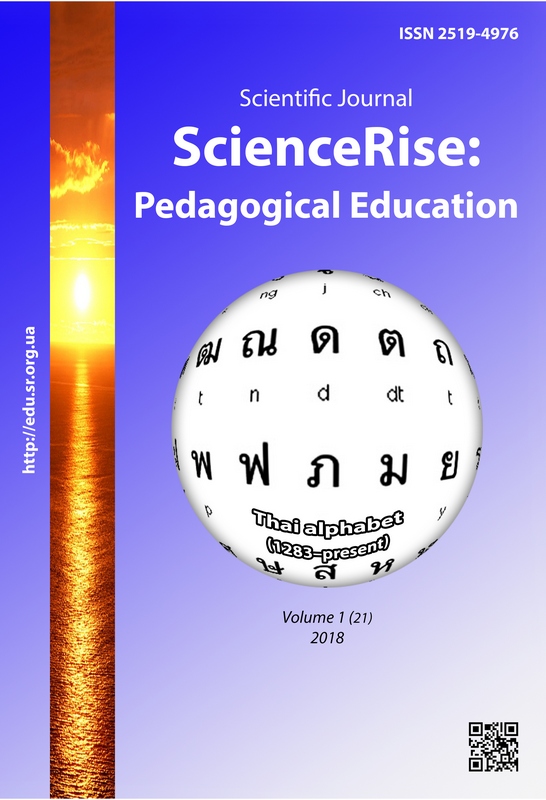Foreign language education as social and philosophical category
DOI:
https://doi.org/10.15587/2519-4984.2018.121023Keywords:
foreign language education, modeling of the speech activity project, educational paradigmAbstract
Foreign language education is considered as a social and philosophical category that proves its scale and versatility. Foreign language education is one of the priority areas of Ukrainian educational policy, for which today foreign language teaching systems are being established at educational institutions on the basis of common documents, directives and recommendations developed by the institutions of education and language policy of the Council of Europe. Foreign language education is one of the priority areas of Ukraine's educational policy. It exists not only for teaching students to acquire a foreign language, but also aims to enrich the inner world of a person, to make it more erudite, bring society to a new level.
Goals, content, educational technologies, resource base of teaching of foreign languages are updated. In the teaching of foreign languages the latest world achievements are actively borrowed. National scholars and public figures defend the idea that the studying of the languages of European nations will raise awareness of the belonging of our people to European civilization and will allow young generation to conduct a parity dialogue with Europeans, to get acquainted with the civilizational values of the European space
References
- Kryuchkov, G. (2002). Strategiya navchannya inozemnikh mov v Ukraini [The Strategy of Learning Foreign Languages in Ukraine]. Inozemni movy v navchalnykh zakladakh, 1-2, 10–13.
- Voytovich, I. K.; Zelenina, T. I. (Ed.) (2012). Inostrannyye yazyki v kontekste nepreryvnogo obrazovaniya: monografiya [Foreign languages in the context of continuing education]. Izhevsk: Udmurtskyi unyversytet, 212.
- Busel, V. T. (Ed.) (2005). Velikiy tlumachniy slovnik suchasnoi ukrains'koi movi [Great explanatory dictionary of contemporary Ukrainian language]. Kyiv-Irpin: Perun, 1728.
- Gusserl, E. (2009). Idei k chistoy fenomenologii i fenomenologicheskoy filosofii [Ideas for pure phenomenology and phenomenological philosophy]. Moscow: Akademicheskiy proekt, 78.
- Vitgenshteyn, L. (2010). Kul'tura i tsennost'. O dostovernosti [Culture and value. About the reliability]. Moscow, 256.
- Tarasova, M. V. (2012). Kul'tura i obrazovaniye: printsipy vzaimodeystviya [Culture and education: the principles of interaction]. Krasnoyarsk: Sibirskiy federal'nyy universitet, 360.
- Passov, E. I. (2008). Tank modernizatsii na nive obrazovaniya [Tank of modernization in the education sphere]. Moscow: GLOSSA-PRESS, 276.
- Radchenko, O. A. (2006). Yazyk kak mirosozidaniye. Lingvofilosofskaya kontseptsiya neogumbol'dtianstva [Language as mirozozidanie. Linguophilosophical concept of Neogumboldtianism]. Moscow: KomKniga, 312.
- Evdokimova-Lisogor, L. A. (2011). Psikhologichna pidgotovka studentiv do protsesu mizhkul'turnoi komunikatsii [Psychological preparation of students to the process of intercultural communication]. Available at: http://www.rusnauka.com/15_NNM_2014/Philologia/7_170378.doc.htm
- Bolshoy entsiklopedicheskiy slovar. Akademik. Available at: https://dic.academic.ru/contents.nsf/enc3p
- Balezin D. (2007). Zachem izuchat' inostrannyye yaziki [Why to study foreign languages]. Available at: http://www.yourfreedom.ru/zachem-izuchat-inostrannye-yazyki/
- Kovalenko, O. (2005). Na shlyakhu do demokratizatsii suspil'stva [On the Way to the Democratization of Society]. Inozemni movi v navchal'nikh zakladakh, 3, 92–100.
- Borisenkov, V. P. (2004). Vyzovy sovremennoy epokhi i prioritetnyye zadachi pedagogicheskoy nauki [Challenges of the modern era and the priority tasks of pedagogical science]. Pedagogika, 1, 3–10.
Downloads
Published
How to Cite
Issue
Section
License
Copyright (c) 2018 Irina Onishchuk

This work is licensed under a Creative Commons Attribution 4.0 International License.
Our journal abides by the Creative Commons CC BY copyright rights and permissions for open access journals.
Authors, who are published in this journal, agree to the following conditions:
1. The authors reserve the right to authorship of the work and pass the first publication right of this work to the journal under the terms of a Creative Commons CC BY, which allows others to freely distribute the published research with the obligatory reference to the authors of the original work and the first publication of the work in this journal.
2. The authors have the right to conclude separate supplement agreements that relate to non-exclusive work distribution in the form in which it has been published by the journal (for example, to upload the work to the online storage of the journal or publish it as part of a monograph), provided that the reference to the first publication of the work in this journal is included.








